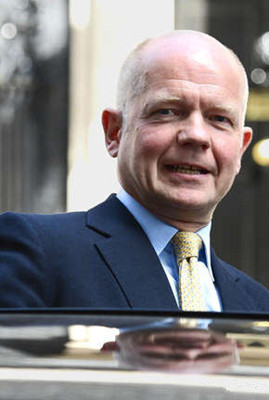英國
A Tory titan retires
一托利黨巨人退休
William, it was really nothing
威廉,真的沒關系
The Conservatives bid farewell to a talented parliamentarian
保守黨向一名才華橫溢的國會議員告別
THE high esteem in which William Hague is held was evident on March 26th even amid the Conservative leader of the House of Commons's shabby last act. To mark the end of the parliament, which also concluded his 26-year-long career as an MP, Mr Hague launched a surprise, failed, bid to oust the speaker, John Bercow, who many Tories dislike. It was typical of the Tories' bungling in Parliament; but, MPs tutted, also an unseemly exit for one of its best performers of modern times.
就算這位下議院保守黨領導人在3月26號的最后一舉顯得低劣,威廉·黑格享有的崇敬還是顯而易見的。為了標記議會的結束,也將他26年的議員生涯畫上句號,黑格讓人們大吃一驚,他企圖將不受托利黨人歡迎的約翰·伯科趕下臺,但失敗了。這是托利黨人在議會拙劣之舉的典型,但對于近代最佳演員之一的黑格來說,引得議員們噓聲一片,這也是一個不體面的退場。

They were wrong. Because the 54-year-old Yorkshireman was following party orders—and that, even more than his laconic drawl and brilliance at the dispatch box, epitomises his career. The episode was also typical of the sort of orders Mr Hague has often had to follow, as an absurdly young Welsh secretary under John Major, as his successor as party leader, and, between 2010 and 2014, as foreign secretary.
他們錯了。因為這位54歲的約克郡人執行的是黨的指令——這一舉甚至超越了他簡潔、慢吞吞的調子和在政務上的傲人之處,成為了他政治生涯的標志。這一插曲也是黑格經常需要遵從的典型指令,無論是作為約翰·梅杰手下年輕得不可思議的威爾士事務大臣,或是梅杰的繼任黨派領導人,還是作為2010到2014年間的外事大臣,都是如此。
So what did he achieve? In an interview in his parliamentary office, Mr Hague names, without hesitation, a law he got passed in 1995 to outlaw discrimination against the disabled as his proudest legislative achievement. His spell as party leader (“I don't regret taking the leadership on, or giving it up; somebody had to do it”) is harder to enthuse about. After a stab at forging a kinder Conservatism—which remains elusive—he fell back on Euroscepticism, was humiliated in the 2001 election and resigned. That he remained an MP was an act of courage, which he burnished with dazzling speeches and unshakable loyalty to his successors. David Cameron, who took the helm in 2005, called him the Tories' deputy leader in all but name.
那他到底獲得了什么成果呢?在他的議員會議室里進行的一次采訪里,黑格毫不猶豫地將1995年他推動通過的一項禁止歧視殘疾人的法律視為他最值得驕傲的立法成就。他作為政黨領導的魅力(“我不后悔扛上領導的擔子,或者將它卸下來,總有人要做這件事”)更難籠絡人心。在試圖創造一個更為溫和的保守主義(仍令人難以捉摸)后,黑格又回到了歐洲懷疑主義,在2001年的選舉中顏面全失隨后辭職。他仍留任議員實屬勇氣之舉,他用言辭閃閃發光的演講和對繼任者不可動搖的忠誠來修飾了這一行為。2005年掌權的大衛·卡梅倫稱其為托利黨非名義上的實際代理領導。
This made Mr Hague the most powerful foreign secretary since Tony Blair, a globe-trotting prime minister, emasculated the job. Even in a time of cuts—which Mr Hague ensured were lighter at the Foreign Office than they might have been—he had an opportunity to strengthen his office (“the best job in the world”) and Britain's place in the world. He did not really take it.
這使得黑格成為了最有權威的外事大臣,因為托尼·布萊爾這位游歷世界的總理無法勝任這份工作。即使在預算削減的時期(黑格保證外事辦公室的削減程度比想象中輕),他仍有機會加強辦公室的力量(“世上最好的工作”)并提升英國在世界上的地位。他并沒有把握住這個機會。
He did some excellent things—restoring confidence to a department he found to be “shockingly” demoralised, including through a renewed emphasis on learning languages and other lapsed skills. He also expanded its operations, opening 20 missions, especially in India and China, the focus of a commercial push. He was also bold, early on, supporting Mr Cameron's championing of the Arab spring, including the intervention in Libya in 2011. Mr Hague describes their failure to win parliamentary support for strikes on Syria's regime in 2013 as one of his “worst experiences”.
他做了一些了不起的事:重塑這個他發現道德”驚人“淪喪的部門的信譽,包括重新強調學習語言和其他失效技能的重要性。他還擴大了部門的運作范圍,新派出了20個駐外使團,特別是在印度和中國這些商業動力的中心。早些時候,他也十分大膽地支持卡梅倫對阿拉伯之春的擁護,還包括2011年對利比亞的干預。黑格認為他們在2013年沒能贏得議會對敘利亞統治下罷工的支持是他”最糟的體驗“之一。
But after that setback Mr Cameron seemed to lose interest in the world. And Mr Hague did nothing obvious to fill the gap. He did not demur when Mr Cameron ordered a pullout from Afghanistan more abrupt than Britain's allies wanted. “We would have been there for decades” otherwise, he says; NATO only wanted Britain to stay, with a tiny force, for a year or two.
但那次挫折之后,卡梅倫似乎對全球事務失去了興趣。黑格也沒有做什么明顯的事來填補空白。當卡梅倫以超乎英國盟友期望的速度突然命令從阿富汗撤軍時,黑格并沒有提出異議。他說,不然“我們本可以在那兒呆上幾十年”。NATO希望英國僅在那兒保留少量武力一到兩年。
Mr Hague's absence from the early Franco-German efforts to end the Ukraine crisis seemed similarly indicative of shrunken ambition. “You can't be everywhere”, he protests. But when it comes to tackling the continent's biggest security threats, Britain should always be with its main European allies. That Mr Hague was meanwhile more prominent in campaigning against rape in war, often alongside the film star Angelina Jolie, seemed a bit odd. The cause was important, but there was little in the history of such campaigns to suggest it would succeed, and the foreign secretary was required elsewhere.
在早期法德希望結束烏克蘭危機的努力中,黑格的缺席似乎同樣是其野心縮減的暗示。他抗議道:“你不可能無處不在。”但若到了處理這片大陸最大安全威脅的關頭,英國應該始終與主要的歐洲同盟站在一條線上。黑格在反對戰爭強奸方面似乎更為聞名,他經常與電影明星安吉麗娜·朱莉一起參加相關活動,這看起來有一點奇怪。原因很重要,但歷史證明這種活動鮮有成功,其他地方更需要外事大臣操心。
He retires to a pile in Wales and the 18th century, about which he writes fine books. It has been a thoroughly commendable political career; but, especially when set against Mr Hague's gifts, not a great one.
他在威爾士衣錦而歸,還寫了一些關于18世紀的好書。這是一段完全值得贊賞的政治生涯,但與黑格的天分相比,這又略顯遜色。 譯者:王穎 校對:張娣












